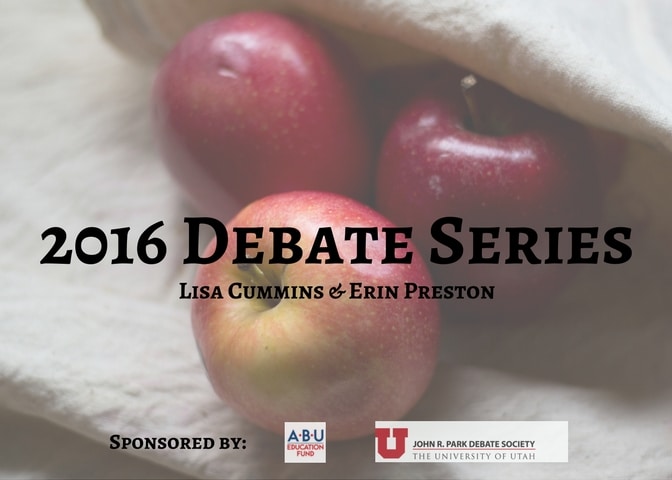You can find this post on our ABU Education Fund website, which sponsored these debates.
Last night, ABU and the John R. Park Debate Society of the University of Utah co-hosted their first local legislative debate of the 2016 election season. Lisa Cummins and Erin Preston debated educational issues in their nonpartisan race for the open District 11 Utah State School Board seat. The goal of these debates is to engage the public in political discourse with the hope of encouraging an informed electorate to take local elections as seriously as national ones. However, that goal is harder to achieve if the public isn’t in attendance. The Jordan School District enrolls over 52,000 students and employs nearly 4,500 teachers and staff members. That means at least 56,000 district residents are directly affected by School Board policy and though students have little ability to control the election outcome, their teachers, administrators, parents, guardians, coaches, and community members do. That makes the debate turnout of 28 people disappointing, especially considering half the audience was between the ages of 2 and 14. Now, I am not asserting that children below voting age should not attend such events; I firmly believe a child’s civic and political education should start at an early age and that parents should be among their teachers. I am asserting that those entrusted with making decisions on behalf of our students should vet a candidate before voting for her.
There are obviously obstacles to attending an event like this one—single parents may need to stay home with their children, guardians might work multiple jobs, location and transportation can be a hindrance, or some may not have heard a debate was even happening. ABU did its best to address these potential speedbumps by hosting the debate in a local community center—fewer than 5 miles from the candidates’ town of Herriman—advertising through Facebook, Twitter and local news outlets, and providing resources to the candidates to promote their debate, but these are often the same obstacles that prevent citizens from voting, particularly in local elections. I suspect the low event turnout reflects our larger struggle with voter turnout. Many argue that a lack of local election coverage by media outlets, misunderstanding of how local government functions, and a disbelief that decisions made by local officials affect the daily lives of citizens keeps interest and participation in local government low.
Local voter turnout in larger cities has, per a Governing report, consistently been below 30% since 2001. The Knight Foundation found that “voter turnout in the 2014 midterm elections (36.3 percent) was the it’s been since World War II.” The Knight Foundation then corroborates the Governing report, citing that research shows only 20% of registered voters turn out for mayoral elections. Admittedly, this local voting cycle coincides with a presidential election—for which turnout is often closer to 60%—and more than the mayor is at stake.
However, the, shall we say, unique nature of the current presidential election may mean midterm and local election turnout doesn’t get the usual boost. An August ABC News/Washington Post poll confirmed what many already believed, virtually tied at a 60% unfavorability rating, former Secretary Clinton and Mr. Trump are the least liked presidential candidates in over 30 years. Furthermore, a Pew Research poll found 57% of voters to be frustrated and 55% to be disgusted with these campaigns; only 15% were optimistic and at 10% even fewer were excited. There is reasonable speculation that many members of the American electorate may choose to stay home on November 8 because they’re disillusioned with the presidential election and strongly oppose both candidates. The consequence is that down the ballot races, including local races like that for the Utah State School Board District 11 seat, will in turn see fewer votes cast.
Local elections are incredibly important, and I will go to my grave affirming that to be true. When there’s at least a 60% chance you won’t like the person running our country come January, it is even more essential to choose local candidates wisely. I would encourage you to research these candidates thoroughly. Lisa Cummins and Erin Preston both have campaign websites (http://www.lisacummins.us/ and http://www.erinpreston.org/) and have conducted numerous interviews regarding this race. Last night’s debate was broadcast via Facebook Live and recorded by KCPW (88.3 FM). And to make sure you get some candidate information before leaving this page, I have included below some of my favorite quotations from the debate—a highlight reel if you will.
Why are they running?
Cummins: “The college and career readiness mantra has been a joke.”
Preston: “I can only sit in the back of the room and have opinions for so long.”
How do they feel about teachers in our current system?
Cummins: “They are mandated and regulated beyond their capacity to perform.”
Preston: “We need specialists in the classroom.”
What about ESSA implementation and testing?
Cummins: It’s a “fallacy that ESSA gives more local control to states.”
“Kids are going home with PTSD”
Preston: “SAGE is broken, but it is not irredeemable.”
“We need to have high standard.”
Where do they stand on college and career readiness?
Cummins: “Why limit them to critical thinking skills?”
Preston: “We’re not preparing them with the critical thinking skills they need.”
What is the role of parents in education?
Cummins: “Make parents understand they are the primary caretakers of their children’s education.”
Preston: “Parents are first and most important, advocates for their children.”
Their Platform, but Shorter:
Cummins: “Local control, local control, local control.”
Preston: “We can do better.”
-By our ABU Education Fund intern, Dakota Park-Ozee

